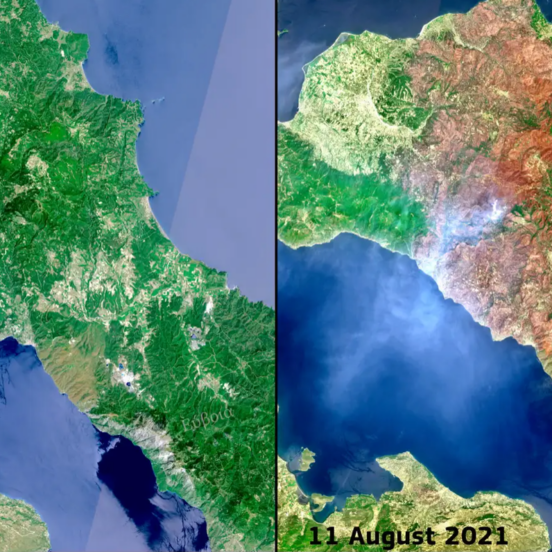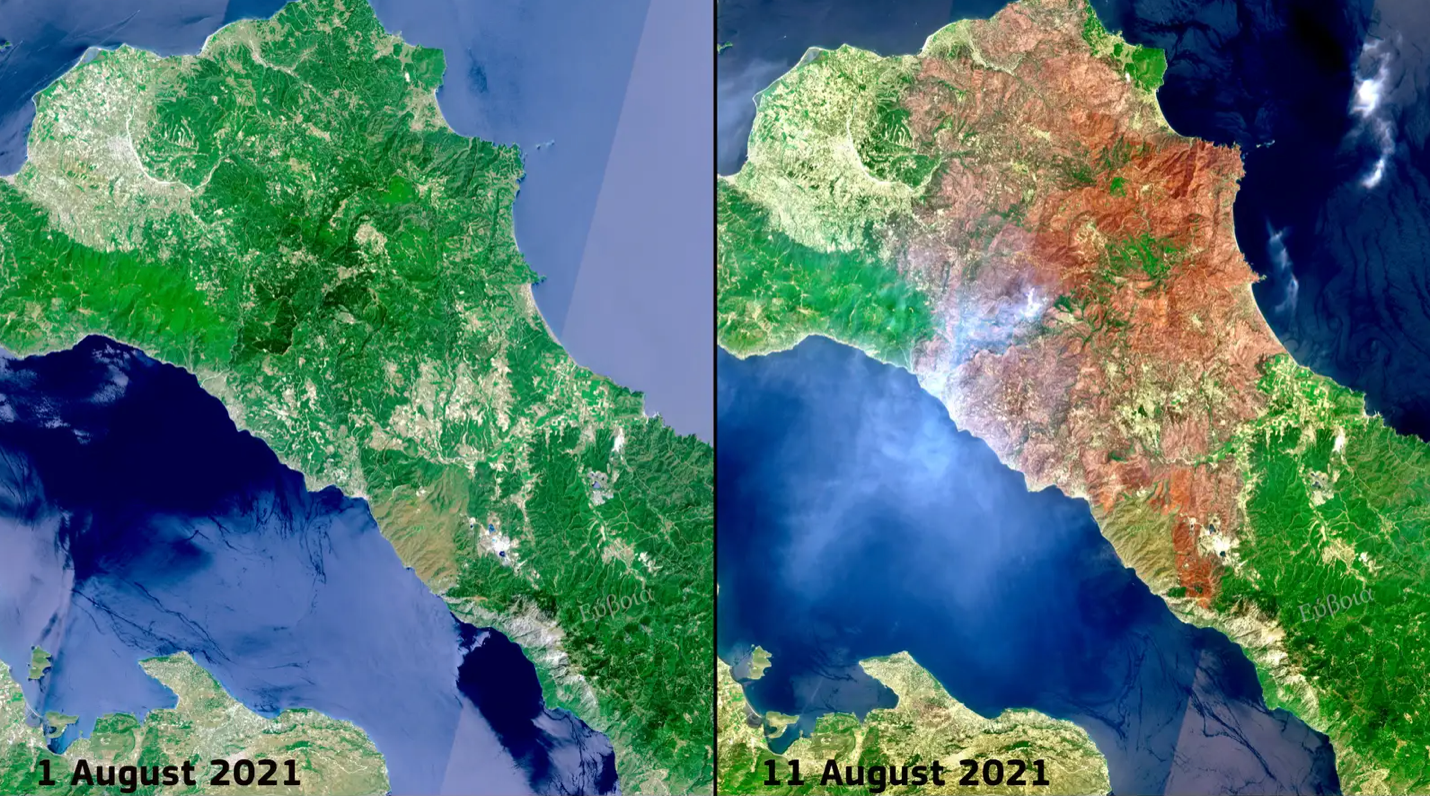Climate, Health and Equity Brief
Dire warnings, scorched Earth and the Senate acts
August 16, 2021

The Climate, Health & Equity Brief is GMMB’s take on the week’s news on the current impacts of climate change. If you haven’t subscribed yet, you can do so by clicking here.
Hot Topic: An uncertain future. The U.S. Senate took two major steps forward on climate action this week with the bipartisan passage of a $1 trillion infrastructure bill followed by the party-line passage of a $3.5 trillion budget resolution, which together include more than $400 billion for a range of climate change mitigation and resiliency initiatives. Progress on this two-track strategy could potentially be derailed in the House, however, where Democrats hold only a three-vote majority and members from the progressive and moderate wings of the party are not seeing eye-to-eye on the way forward.
Meanwhile, an alarming report from the Intergovernmental Panel on Climate Change released Monday confirms that climate change is “unequivocally” caused by human activity, a temperature rise of at least 1.5°C within the next two decades is locked in, and without immediate action to achieve net-zero emissions by 2050 and significant reductions even sooner, global average temperatures could increase by as much as 4°C, which would have devastating consequences for every region of the globe and every living thing on earth.
And while it’s only 2021, the world is already on fire. California is experiencing its second-largest wildfire in history, which has burned for a full month and is only 30 percent contained as it continues to reduce entire towns to ash. There have been 240 wildfires in Turkey, 300 in British Columbia and 600 in Greece in recent days. And the nearly 100 massive wildfires currently burning in Siberia are bigger than all others in the world combined. Firefighters are sounding alarm bells that the blazes they are contending with are demonstrating behavior they have never seen, feeding off of intense drought and extreme heat conditions to create their own weather patterns in addition to pyrocumulus clouds, dry lightning, and firenadoes.
We can only hope that the dire warnings from the IPCC and the shocking, scorched-earth images from around the world will inspire world leaders—and the U.S. Congress—to take the actions necessary before it is too late.
— Matt & Traci, GMMB
Planetary Health
An alarming report from the Intergovernmental Panel on Climate Change (IPCC) finds that humans have had an “unequivocal” influence on climate change and warns that this decade is humanity’s last chance to limit warming. (Bloomberg)
While the IPCC report revealed that a 1.5°C rise in planetary temperature is now unavoidable, the potential to limit warming to below 2°C—and avoid even more catastrophic climate impacts—is still possible if the world can achieve net-zero carbon emissions by 2050. (The New York Times)
For the first time in recorded history, wildfire smoke has reached the North Pole, traveling nearly 2,000 miles from Siberia, where 190 fires—that together are larger than all other blazes around the world combined—continue to burn. (The Guardian, The Washington Post)
One week after 240 wildfires in southern Turkey killed eight people and forced 36,000 to evacuate, nearly 600 blazes are now raging across neighboring Greece and 300 are burning in British Columbia, all exacerbated by extreme heat and/or drought. (Reuters, CNN)
A new study revealed that just five percent of global power plants—all of which are coal-fired—account for 73 percent of electricity sector carbon emissions worldwide. (Yale Environment 360)
Human Health
As wildfires rage across 15 states in the Western U.S., the EPA revealed that the number of unhealthy air quality days to date in 2021 is more than double the total from within the same timeframe in each of the last two years. (Axios)
At least 25 million people are facing a powerful “heat dome” under which high humidity and heat that is 10-15 degrees above normal are making for dangerously hot conditions across the U.S. West, Pacific Northwest, Central and Mid-Atlantic regions. (Axios)
The Dixie Fire is now the second largest wildfire in California history, burning more than 515,000 acres, destroying at least 1,100 structures, threatening 14,400 more and displacing 2,000 residents so far. (Grist, Los Angeles Times)
Officials believe that more than 300 water wells supplied by the Klamath River basin have run dry along the California-Oregon border due to historic heat and drought conditions, forcing families to travel miles for water from neighboring cities. (AP News)
The alarm bells are deafening, and the evidence is irrefutable: greenhouse gas emissions are choking our planet and putting billions of people at immediate risk.”
-U.N. Secretary General António Guterres
Equity
Many of the 50,000 people displaced by California’s 2018 Camp fire remain without proper housing, with many low-income residents facing eviction and homelessness due to prohibitive permitting fees and the high costs of both fire insurance and materials needed to rebuild their homes. (Los Angeles Times)
Politics & Economy
The Senate passed a $1 trillion bipartisan infrastructure bill and $3.5 trillion Democratic budget plan this week, both of which propose critical climate resilience investments and funding for a host of climate programs. (The New York Times)
Although Mr. Trump has been out of office for more than six months, his negative impacts on climate science continue, with many federal climate and environment agencies still short-staffed after hundreds of government scientists quit under his administration. (The New York Times)
Despite extreme heat causing more than 800 deaths and 70,000 injuries among American workers between 1992 and 2017, a new investigation revealed that OSHA has ignored petitions from environmental groups and the CDC to enact heat safety regulations for decades. (Politico)
Action
FEMA announced the agency will provide states with $3.5 billion in grants for climate resiliency projects as the U.S. shifts its disaster policy to proactively fund hazard mitigation for floods, wildfires and other natural disasters. (The New York Times)
Bill Gates’ Breakthrough Energy Catalyst program and the U.S. Department of Energy signed a groundbreaking partnership this week that commits $1.5 billion over the next three years for emissions reduction projects included in the bipartisan infrastructure deal. (The Wall Street Journal)
Kicker
Check out this interactive map from the IPCC report that shows how weather around the world will be affected by different greenhouse gas emissions scenarios.
The GMMB Climate, Health & Equity Brief would not be possible without the contributions of the larger GMMB California team—Aaron Benavides, Elke Cortes, Stefana Simonetto and Sydney Lykins. Feedback on the Brief is welcome and encouraged and should be sent to CHandEBrief@gmmb.com.






